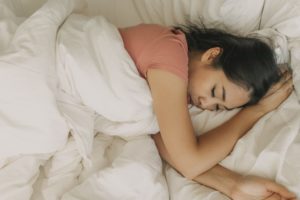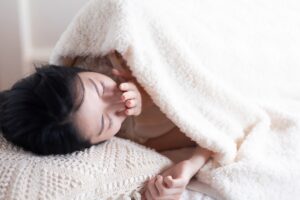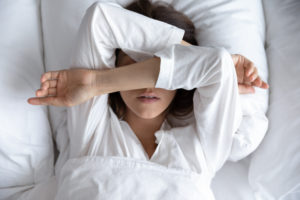Is It Bad to Sleep With Wet Hair?
Taking a hot bath or shower at night may be the best way to unwind after a stressful day. In fact, a number of studies have shown that a hot bath or shower before bed can improve overall sleep quality and help someone fall asleep more quickly.
For some people, bathing at the end of the day includes washing their hair, which may still be wet when they get into bed. It is a commonly held belief that sleeping with wet hair is a bad idea, increasing the risk of waking up with a cold or leading to a head of tangled and broken tresses.
Despite these widely held beliefs, there is not a lot of strong scientific evidence that sleeping with wet hair is going to cause problems for everyone. Depending on the circumstance, a person should consider the potential risks of sleeping with wet hair and how to take care of your hair while you sleep.
Looking to improve your sleep? Try upgrading your mattress.
Drawbacks of Sleeping With Wet Hair
As wet hair dries overnight, some water evaporates into the air and some becomes absorbed by pillows and other bedding. Sleeping on a warm damp surface can create an environment near the face and scalp that might cause problems. People who regularly go to sleep with wet hair may want to look out for any changes in the health of their skin or hair when deciding whether to continue with this kind of bedtime routine.
Although research studies have not thoroughly explored the potential side effects of sleeping with wet hair, some people still caution against this habit, believing that sleeping with dry hair can help prevent certain health problems.
Hair Damage
Sleeping with wet hair does not always cause damage, but may increase the likelihood of waking up with tangled or broken strands. Each strand of hair is made of a complex network of proteins and cells that determine the strand’s strength and elasticity, or how much it can stretch before returning to its original state. Wet hair that has not been chemically treated has the ability to be stretched by up to 30% of its original length without causing serious damage or breaking.
However, chemically treated hair is more fragile and prone to breakage. Each strand of hair is naturally protected by a layer of brittle scale-like cells called the cuticle. The cuticle contains certain types of fatty acids that make it hydrophobic, or less likely to absorb water when wet.
Some hair styling products strip fatty acids from the cuticle, allowing more water to be absorbed. This can cause a hair strand to swell and weaken its overall structure. Without proper care, chemically treated hair is more likely to become frizzy and tangled as it dries. The added friction from sleeping on a pillow with wet hair may also make things worse, pulling some strands of hair farther than their elasticity allows, leading to breakage.
Acne
There is no direct evidence that sleeping with wet hair will cause a person to develop acne. Nonetheless, some people caution against sleeping on a damp pillow, believing it to be an ideal environment for certain types of bacteria to thrive, potentially increasing the risk of skin problems like acne.
Acne can happen when pores become blocked by the body’s natural oils and dead skin cells. In most cases, acne is due to family history or to changes in hormone levels which can increase the body’s natural oil production and influence how well the skin clears away oil and dead skin cells .
A pillow that is damp or has collected residue from hair products could potentially make acne worse by creating an environment that is humid or oily, leading to clogged pores and inflammation. For these reasons, some experts suggest it is better to sleep with clean and dry hair that is pulled away from the face.
Scalp Infections
There are many types of fungi on our bodies and in the environment that do not pose problems to our health. Both pillows and hair follicles can harbor certain types of fungi. However, in the right conditions, some can cause infections and diseases that affect the scalp and other areas of the body.
- Tinea capitis: Fungal species thrive in moist areas and can cause a scalp disease called tinea capitis . It can cause itching and hair breakage, appearing as bald patches with black dots and red, swollen, and flaky areas on the scalp.
- Malassezia: Malassezia can be found in the hair follicles, and has been linked with a skin disease called seborrheic dermatitis. This type of dermatitis can cause dandruff to form on the scalp and oily and yellow patches of skin on the face and head.
- Aspergillus fumigatus: Aspergillus fumigatus is a type of fungus that has been shown to be present in pillows. It can cause aspergillosis , an infection that may lead to serious respiratory disorders in some people.
Most fungal infections are more likely to occur in people with weakened immune systems. Those who are concerned about their risk of a fungal infection should talk to their doctor about their bedding and if sleeping with wet hair could pose a risk to their health.
Getting Sick
Many people believe that sleeping with wet hair can increase the risk of developing a cold. However, there is no scientific evidence that wet hair directly causes any type of illness. Similarly, it has been long thought that exposure to cold temperatures causes the common cold, but there is little evidence to support that theory.
Common colds can occur around two to three times per year in most adults. Colds are caused by viruses that infect the respiratory system, including the nose and sinuses. These viruses spread within air droplets released by coughing and sneezing, as well as on contaminated surfaces, which do tend to spread more frequently during the winter months.
Tips for Sleeping with Wet Hair
People may sleep with wet or damp hair for a variety of reasons. Some may choose to shower at the end of the day as part of their relaxing bedtime routine and feel more comfortable getting directly into bed with wet hair. Some hairstylists may suggest sleeping with conditioned damp hair to enhance certain hairstyles.
Whether intentional or or not, there are steps you can take to make sleeping with wet hair a better experience overall.
- Use a silk pillowcase: A silk pillowcase provides less surface friction when compared to a regular cotton pillowcase. Some early research studies have investigated whether using a silk pillowcase is beneficial for skin health and some hairstylists believe it can reduce the risk of hair breakage and tangling.
- Apply oil: Commercial hair oils have long been used for protection from hair damage. Studies have shown the effectiveness of coconut oil, as it reduces protein loss from the hair upon washing. Another commonly used oil is argan oil, which has been shown to keep hair moisturized.
- Wear a hair cap: Wearing a hair cap or scarf may help protect your hair from damage by easing friction between your hair and your pillow while sleeping.
- Use conditioner: Hair conditioners contain substances that help detangle hair and reduce friction. The reduction in friction may decrease hair damage induced by tossing and turning during sleep. Leave-in conditioner may also be beneficial for hair moisture and protection.
- Alter your bedtime routine: Start your bedtime routine at an earlier time to ensure that there is enough time to dry your hair before getting into bed. A hair dryer may be used to speed up drying, but it can also cause hair damage if used frequently.

Still have questions? Ask our community!
Join our Sleep Care Community — a trusted hub of sleep health professionals, product specialists, and people just like you. Whether you need expert sleep advice for your insomnia or you’re searching for the perfect mattress, we’ve got you covered. Get personalized guidance from the experts who know sleep best.
References
6 Sources
-
American Academy of Dermatology Association. (n.d.). Acne-like breakouts could be folliculitis.
https://www.aad.org/public/diseases/a-z/folliculitis -
Gavazzoni Dias M. F. (2015). Hair cosmetics: An overview. International Journal of Trichology, 7(1), 2–15.
https://pubmed.ncbi.nlm.nih.gov/25878443/ -
National Institutes of Health. (2018 July). Acne breakouts. NIH News in Health.
https://newsinhealth.nih.gov/2018/07/acne-breakouts -
A.D.A.M. Medical Encyclopedia. (2020, November 10). Ringworm of the scalp. MedlinePlus.
https://medlineplus.gov/ency/article/000878.htm -
Ruenger, T. M. (2021 April). Seborrheic dermatitis. Merck Manual Consumer Version.
https://www.merckmanuals.com/home/skin-disorders/itching-and-dermatitis/seborrheic-dermatitis -
A.D.A.M. Medical Encyclopedia. (2021 June 20). Aspergillosis. MedlinePlus.
https://medlineplus.gov/ency/article/001326.htm











